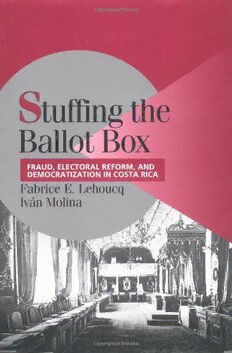
Stuffing the Ballot Box: Fraud, Electoral Reform, and Democratization in Costa Rica PDF
296 Pages·2002·1.427 MB·English
Most books are stored in the elastic cloud where traffic is expensive. For this reason, we have a limit on daily download.
Preview Stuffing the Ballot Box: Fraud, Electoral Reform, and Democratization in Costa Rica
Description:
This pioneering study of electoral fraud and reform focuses on Costa Rica, a country where parties gradually transformed a fraud-ridden political system into one renowned for stability and fair elections by the mid-twentieth century. Lehoucq and Molina draw upon a unique database of more than 1,300 accusations of ballot-rigging to show that, independently of social structural constraints, parties denounced fraud where electoral laws made the struggle for power more competitive. They explain how institutional arrangements generated opportunities for several executives to assemble legislative coalitions to enact far-reaching reforms.
See more
The list of books you might like
Most books are stored in the elastic cloud where traffic is expensive. For this reason, we have a limit on daily download.
